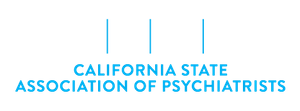Wednesday, SB 1337 (the bill that CSAP has been working on with Senator McGuire) passed its first test in the Senate Health Committee 9-0. Dr. Tara Niendam (who works at UC Davis) and Bonnie Hotz, the parent of a then-child / now adult treated at UC Davis, both provided outstanding testimony. Senator Eggman asked to be added as a co-author. In addition to CSAP, SB 1337 was supported by the Council of Community Behavioral Health Agencies, the County Behavioral Health Directors Association, the Kennedy Forum, and the Steinberg Institute. The California Association of Health Plans and others opposed the bill.
SB 1337 would require a health plan contract or health insurance policy issued, amended, or renewed on and after January 1, 2023, to provide coverage for coordinated specialty care (CSC) services for the treatment of first-episode psychosis (FEP), which is a team-based service delivery method composed of the following treatment modalities and affiliated activities: a) Case management, as specified; b) Family support and education, as specified; c) Pharmacotherapy and medication management, as specified; d) Individual and group psychotherapy, as specified; e) Supported education and employment (SEE), as specified; f) Coordination with primary care, as specified; and, g) Outreach and recruitment activities.
SB 1337 would require the referral process to identify potential referring entities, including, but not limited to, mental health facilities, health systems, emergency departments, primary care practitioners, educational institutions, professional organizations, family organizations, consumer organizations, social service programs, substance use disorder programs, criminal justice systems, and places of worship. Requires the outreach and referral process to implement and maintain systems to track all the outreach activities and referrals. 2) Requires the treatment modalities and affiliated activities described in 1) to be performed by a team that consists of the following members, provided that there may be flexibility in the actual composition of the team members, as the team structure is described in the CSC manual: a) A team leader who is a licensed clinician; b) An individualized placement and support specialist; c) A skills trainer who is a licensed clinician; d) A psychiatrist; e) A certified peer support specialist with lived experience with a mental illness; f) An outreach and referral specialist; and, g) Other team members, as appropriate, based on the team structure of existing CSC programs throughout the country that adhere to appropriate fidelity measures and have demonstrated sustained positive outcomes using an alternative or supplemented team structure.
For some local press coverage of Senator McGuire’s efforts, see here: Mental health bill clears key Senate committee.
SB 1337 now moves to the Senate Appropriations Committee. SYASL has spoken the Appropriations Committee Chairman Anthony Portantino and believes he understands the bill well and is inclined to support it.
Also, for those of you wondering about a CSAP Advocacy Day in 2022, yes there will be one. CSAP and SYASL have been waiting to know the fate of SB 1337 in the Senate. As this picture becomes clearer, the Government Affairs Committee and Board will discuss options for some time in late May / early June. This will allow for the greatest impact as it will also be after release of the Governor’s May Revise and closer to the home stretch of state budget deliberations as well as timely for the setting of bills for policy committee hearings in the second house (e.g. SB 1337 and Senator Eggman’s bill package). Stay tuned for more information!

